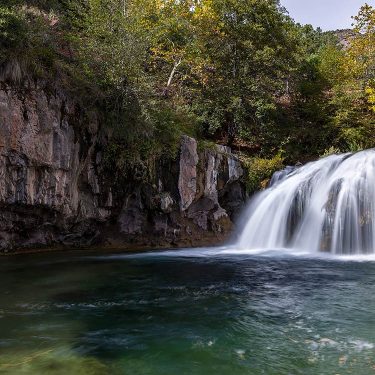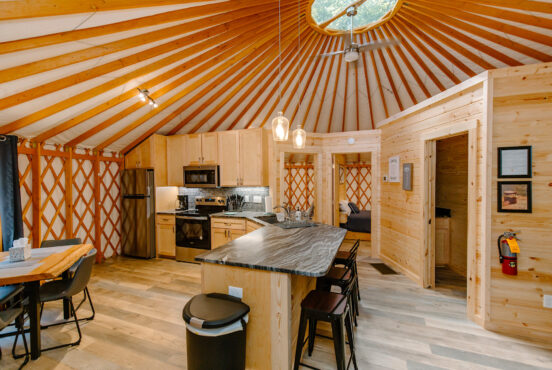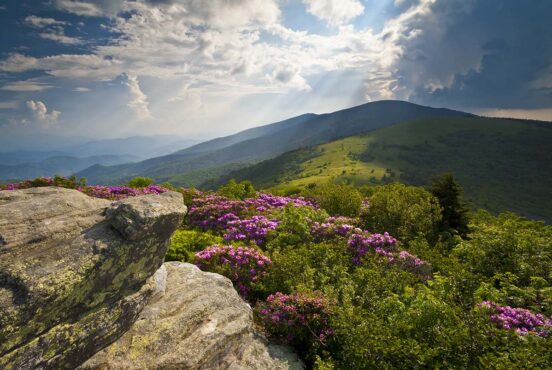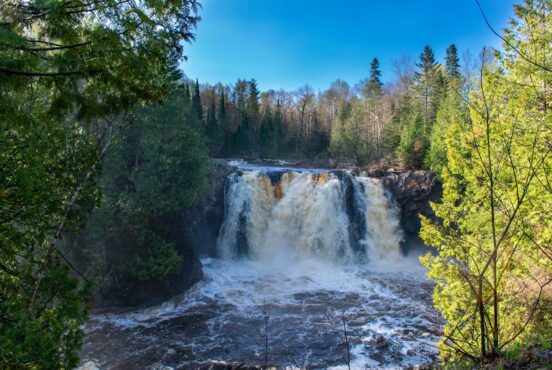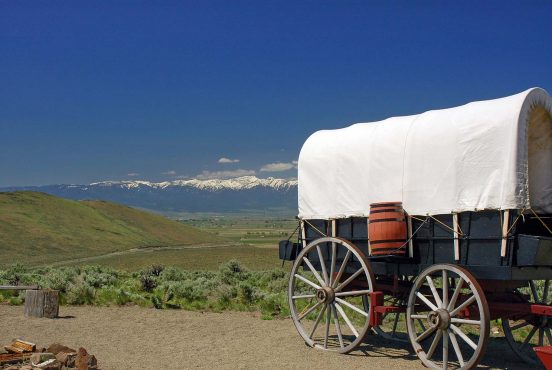Asheville, North Carolina is an outdoor mecca filled with hiking and biking. Here’s what to do with your long weekend.
The mountain town of Asheville is both a basecamp and popular adventure hub located in western North Carolina, not far from the Virginia border. After hearing a lot of buzz about how underrated the outdoor destination is, I finally decided to visit. So, I packed up our campervan with my husband and daughter and took a multi-day sojourn down south to finally see what all the hype was about.
Outdoor recreationists will know of Asheville’s many hiking trails, natural features and exciting terrain. It sits at the confluence of two major rivers, from which multiple waterways flow out of and through. It’s also surrounded by mountain ranges like the Pisgah National Forest and Great Smoky Mountains. Perched upon a plateau, the Land-of-Sky city provides easy access to some of the Blue Ridge Parkway’s most scenic stretches, from which countless hiking trails shoot off the 469-mile-long roadway.
To me, the location is truly what sets it apart from other well-known adventure hubs. Unlike its western counterparts, Asheville is heavily influenced by the local Appalachian culture. This is a worthwhile departure from the standard mountain town vibe. Think: outdoor adventure haven with plenty of southern charm, amazing food and drink, plus mountains and rivers in every direction. Not too bad, huh?
Read on for a curated guide to Asheville’s hiking trails and other ways to explore this Carolina city once your boots get tired.

Day One in Asheville: Bike or Paddle in the River Arts District
When you first arrive in Asheville, head straight to the River Arts District and find a parking spot along the French Broad River, your basecamp for the day. This eclectic neighborhood hums with creativity and is packed full of artists working in their studios, art galleries, and shops. Breweries (like Asheville’s famous New Belgium Brewery), food trucks, and other laidback eateries are interspersed throughout the area and everything can easily be accessed on foot.

The real highlight is the river itself, which begins up high in the mountains and flows through the heart of Asheville all the way to Tennessee. But stay local and enjoy the riverfront because there are many ways to do that without even leaving the neighborhood. Two short multi-use greenways on either side of the river can be connected for a longer trail: the Wilma Dykeman Greenway and French Broad River Greenway. The Wilma Dykeman Greenway is about two miles long, and the French Broad River Greenway is 2.8 miles. This is perfect for exploring without getting in a car. We biked this section, but keep it on your list for a scenic urban hike.
At the French Broad River Park, you’ll also find plenty of a green space to picnic or relax outside and people watch. If you want to get on the water, you can find kayak and stand up paddleboard outfitters to rent from or take a guided tour.
Day Two in Asheville: Drive the Blue Ridge Parkway and Hike Pisgah National Forest
A sprawling mountainous landscape can be accessed from downtown Asheville at nearly every angle. Choosing a direction is as simple as deciding what kind of adventure you want. Given that we were hiking with our little one, we had to narrow our options and stick to shorter distances. Luckily, that didn’t mean sacrificing a heart-pumping hike or skipping out on the big vistas.
This itinerary takes you directly from the River Arts District straight onto the Blue Ridge Parkway. It’s the national highway that runs between two of the most beautiful east coast national parks: Shenandoah and Great Smoky Mountains. Head south into the Pisgah National Forest and you’ll hit your goal (milepost 408 on the parkway) in under 40 minutes. This iconic scenic byway snakes its way down to the final stretch of its southern terminus. This is where you’ll enter into the Pisgah National Forest, an area of natural and historical significance. The forest is home to both the Blue Ridge Mountains and Great Balsam Mountains. Each boast their own impressive trail networks with some of the highest peaks east of the Mississippi.

Fun fact: this 500,000 acre parcel of land was the first to be purchased under the Weeks Act of 1911. It was a groundbreaking act that created a cascade effect of even more national forest lands and the first two designated wilderness areas in the eastern United States. For the forestry nerds among us, the first school of forestry was established in the Pisgah National Forest, which is still preserved today.
As you wind your way through the region, there are jaw-dropping (and at times, heart stopping) views the entire time. Dozens of trailheads litter the Parkway so you’ll have your pick of hikes to do. Even more panoramic vistas greeted us when we finally pulled into the Mount Pisgah Trailhead. Truly, you could pull off at any point and choose your own adventure.
We chose a short and sweet hike to the summit of Mount Pisgah with our little girl in the pack. I’d highly recommend, however, a longer trail and finding a spot to camp for the night.

Day Three in Asheville: Visit Black Mountain and Hike the Black Mountain Range
The super charming town of Black Mountain is worth the quick 20-minute drive outside of central Asheville. It’s also a great final stop for a last hurrah as you make your way out of town.
A tiny but mighty mountain village, it has a picturesque main street lined with shops and mountains in the backdrop. Spend some time browsing, sample some local craft beer, and take in all of the local flavor before venturing into the mountains.

While we took full advantage of shorter trails, one of the best in the region is located in the Black Mountain Range. At 6,684 feet, Mount Mitchell is also accessible by car via the Blue Ridge Parkway. But, if you ask me, bagging this peak would be way more fun. However, the area offers plenty more opportunities to get up high. This includes the 9.5-mile-long Graybeard Trail, providing a view of famed Mount Mitchell itself.
Seen in: Destinations, Guides, Hikes, Hiking, North Carolina, Road Trips, Travel

